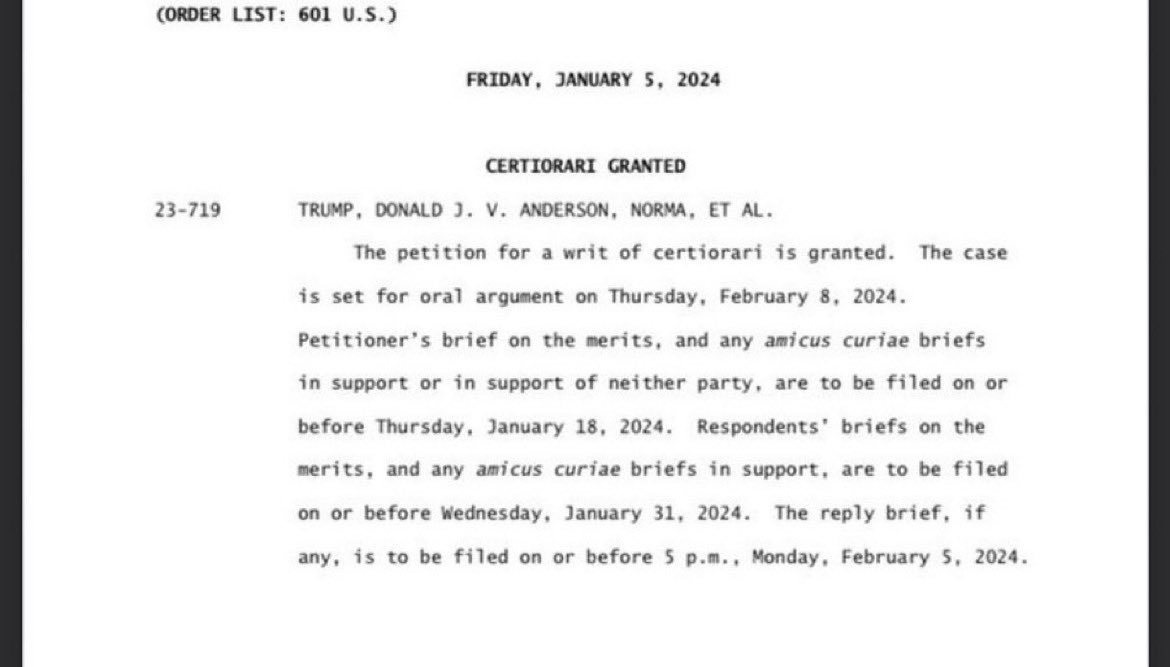The U.S. Supreme Court on Friday agreed to take the case on whether Donald Trump could be deemed ineligible to run for president because of the ‘insurrection clause’ in the 14th Amendment of the U.S. Constitution.
The high court will rule on the Colorado Supreme Court’s decision to remove Trump from the state’s Republican primary ballot.
Oral arguments will begin on February 8th.
JUST IN:
The US Supreme Court will take up the case of President Trump being removed from the ballot in Colorado and Maine.
Oral arguments will begin on February 8.
Their decision will determine whether or not states can remove President Trump from the ballot over Section 4… pic.twitter.com/yIdjsWOnfj
— Laura Loomer (@LauraLoomer) January 5, 2024
“The brief order said the case would be argued on an accelerated schedule on Feb. 8, indicating that a ruling will follow soon after,” NBC News reports.
🚨 BREAKING: The Supreme Court agrees to weigh whether Trump can be kicked off Colorado’s Republican primary ballot.
— Benny Johnson (@bennyjohnson) January 5, 2024
Per NBC News:
If the Supreme Court rules for Trump, then he would stay on the ballot. But should the court uphold the Colorado ruling, then other states could be encouraged to follow suit.
There is also the possibility that if Trump is kicked off the ballot, Republicans could take retaliatory action by doing the same to President Joe Biden. Texas Lt. Gov. Dan Patrick has already floated such a move.
The Colorado Supreme Court ruled on Dec. 19 that Trump was ineligible to appear on the Republican primary ballot in the state, although it put the ruling on hold to allow for appeals of its decision. In the meantime, Maine’s top election official reached a similar conclusion, further heightening the stakes. Unless the Supreme Court acts quickly, any decision could have limited impact during the primaries, but the logic would likely apply to the general election as well.
The Colorado Supreme Court based its ruling on language in the Constitution’s 14th Amendment that prohibits those who “engaged in insurrection” from running for various federal offices. Among the novel legal questions presented by the case are whether the language applies to candidates for president and who gets to decide whether someone engaged in an insurrection.
“Trump is separately appealing to state court a ruling by Maine’s Democratic secretary of state, Shenna Bellows, that he was ineligible to appear on that state’s ballot over his role in the Capitol attack,” the Associated Press writes.
The appeal of the Colorado ruling will be the most significant moving forward.
The Supreme Court has never ruled on Section 3 of the 14th Amendment, adopted in 1868 to prevent Confederates from regaining their former government posts.
Whatever the high court decides for Colorado will apply to the other 49 states.
Both rulings are on hold until the appeals conclude.
From the Associated Press:
The high court’s decision to intervene, which both sides called for, is the most direct involvement in a presidential election since Bush v. Gore in 2000, when a conservative majority effectively decided the election for Republican George W. Bush. Only Justice Clarence Thomas remains from that court.
Three of the nine Supreme Court justices were appointed by Trump, though they have repeatedly ruled against him in 2020 election-related lawsuits, as well as his efforts to keep documents related to Jan. 6 and his tax returns from being turned over to congressional committees.
At the same time, Justices Amy Coney Barrett, Neil Gorsuch and Brett Kavanaugh have been in the majority of conservative-driven decisions that overturned the five-decade-old constitutional right to abortion, expanded gun rights and struck down affirmative action in college admissions.
Some Democratic lawmakers have called on Thomas to step aside from the case because of his wife’s support for Trump’s effort to overturn the results of the election, which he lost to Democrat Joe Biden. Thomas is unlikely to agree. He has recused himself from only one other case related to the 2020 election, involving former law clerk John Eastman, and so far the people trying to disqualify Trump haven’t asked him to recuse.








